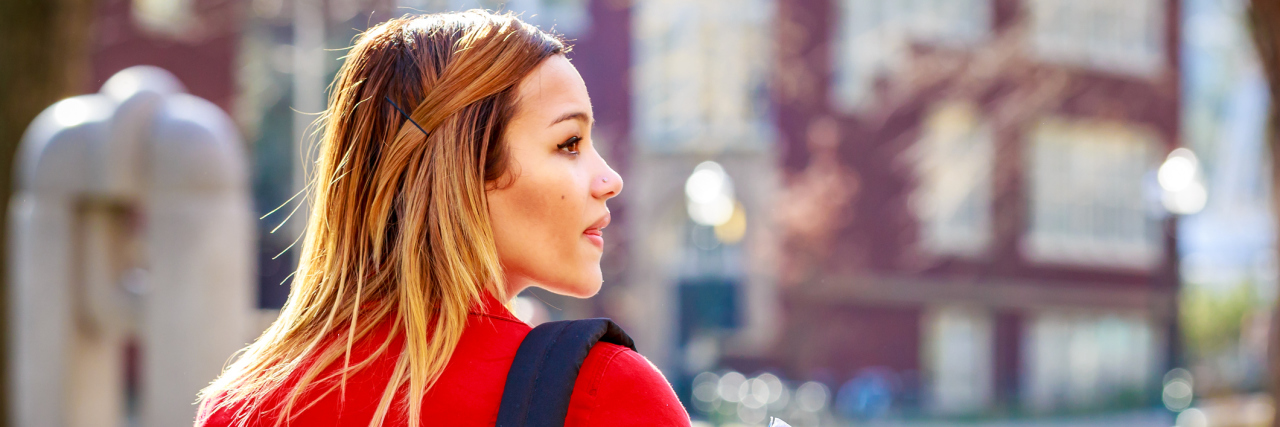There are a lot of things about being a full-time student with chronic illness/disability that other college students don’t understand, but one of the things I personally think goes the most easily overlooked is the unrelenting pressure to do well. A lot of people will argue that all college students live with this, and they certainly do to a degree. But there is a lot of pressure that accompanies chronic illness/disability that other students place upon us, unwittingly, but also a lot of pressure from our society as a whole.
• What is Ehlers-Danlos Syndrome?
• What Are Common Ehlers-Danlos Syndrome Symptoms?
Generally speaking, most students go to college because they want to further their education and increase their future job prospects, which I do too, but I also go to school as a distraction. A distraction from all of the pain that I am in and all of the parts of my body that have decided to rebel against me. I use my classes and classwork to some degree as an escape, a way to not have to think about it. But of course, that’s easier said than done. Every day I must attempt to override my natural inclination to look really angry all the time – even though I’m not angry, my legs just hurt. Every day I must keep my cool as other students and professors look me up and down, eye my cane and ask, “oh what happened?” These situations place immense pressure to stay peppy and perky, no matter what, because you don’t want to come off as rude or bitter.
But this being my mode, throw myself into my work and pretend that everything is fine, leads to two outcomes. One is where people are telling you that you’re an inspiration left and right and you really have no idea what you’re supposed to say back in response, and then feel like you now can’t slip up. Show no weakness. That whole thing from Frozen, “conceal, don’t feel, don’t let them know.” It makes you feel like you have no place in being truthful about how much the workload takes its toll, how little you get to do outside of your schoolwork because it takes so long to do everything that your professors ask you to. The second outcome is that people pretend the disability is not there. You seem fine, so you must be fine. It’s the other side of the “invisible illness” coin. On the one side, people get upset with you because “you don’t look sick,” but on this side, people don’t even react. There is no modification of behavior to understand the disability. Just because I can do this, does not mean that I can do everything else. And this can make you feel torn: Do I tell them I can’t do it because of my illness, or do I struggle through it anyway because I don’t want people to think I am “weak” or question the other things I can do? I’m guessing many of us might choose the second option.
There is pressure to participate in the “typical college experience” – late night parties, binge drinking, pulling all-nighters (this happens but not intentionally — painsomnia is ever-present), dating. If we give in to one thing, people expect us to give in on another. It takes a very long time to explain the medical basis for not participating so you either don’t do it and deal with the social isolation or you do, and still deal with the social isolation because many people don’t understand. This is where universities should be promoting ways for people with disabilities and chronic illnesses to be meeting one another when they want to, to find solace in someone who understands — it changes everything about the experience.
Finally, one of the great hidden pressures of being a student with chronic illness and disability is based on what is at risk if you do not do well. Chronic illnesses are complicated and require a lot of management and are unpredictable. Many people with illness and disability struggle to complete their degree at all, let alone complete it “on time.” But what people don’t see when they say, “oh, well if you don’t feel well, just slow down” or “take it at your own pace, you can take a semester off” is that no, some of us can’t. In many cases, we spoonies and zebras are covered by our parents’ health insurance. Well, even with the expansions from the ACA, we are only allowed until age 26. So what if you cut down to half-time and take a semester or two off when you need a respite? You get closer and closer to the cut-off of your lifeline. Your doctors (even when they aren’t all very understanding), they know your condition, they treat your condition, they enable you to keep on pushing. If you live in an expansion state, the pressure may be lessened slightly, but if you’re like me, in a non-expansion state, there aren’t many other options.
I think of this every day. I think of how much pressure I am under and how much people don’t understand. But every day I remember that there are a lot of people who understand. There are a lot of people who are in the exact same position I am in. And those people give me strength to continue doing all that I do. Knowing that someone, somewhere, even if I don’t know them, understands what I am dealing with, is a comforting thought. Yes, sometimes I still feel alone in my battle, we all do. But, it helps alleviate the pressure. And I hope someone else can take solace in knowing that I understand the pressure they are under. Because, alone we are rare, but together, we are strong.
Getty Image by Png-Studio

